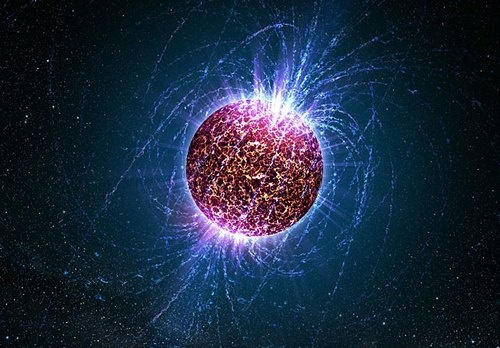Una magnetar arresta improvvisamente la sua rotazione a causa di un raro evento / A magnetar suddenly stops spinning due to a rare event
Una magnetar arresta improvvisamente la sua rotazione a causa di un raro evento / A magnetar suddenly stops spinning due to a rare event
Una magnetar arresta improvvisamente la sua rotazione a causa di un raro evento / A magnetar suddenly stops spinning due to a rare event
Per gli esperti all’origine del fenomeno che ha
coinvolto SGR 1935+2154 ci sarebbe una sorta
di eruzione.
Circa due anni fa un gruppo di scienziati osservò i
resti di una stella lontana oltre 30mila anni luce
cambiare improvvisamente la velocità di
rotazione. In un periodo ridotto, la sua rotazione si
fermò quasi completamente; un evento che non
aveva alcuna spiegazione, fino ad oggi. Il corpo
celeste in questione è una magnetar, un rara
tipologia di stella di neutroni caratterizzata da un
potente campo magnetico. Ora, grazie a nuovi dati
di un gruppo di astrofisici, è stata avanzata una
teoria che spiega l’origine del misterioso fenomeno
che ha coinvolto “SGR 1935+2154“. Secondo la
ricerca, pubblicata su Nature Astronomy,
l’improvviso rallentamento potrebbe essere
provocato da una sorta di rottura sulla superficie
della stella, paragonabile in un certo senso ad un
evento vulcanico, che ha prodotto un “vento” di
particelle nel cosmo. I dati dell’astrofisico
Matthew Baring e dei suoi colleghi hanno mostrato
come questo particolare vento potrebbe alterare i
campi magnetici della stella, producendo anche dei
segnali radio (registrati nei giorni successivi).
“In tanti avevano ipotizzato che le stelle di neutroni
potessero avere una sorta di vulcani sulla loro
superficie,” ha spiegato Baring. “Il nostro studio
indica che potrebbe essere così ed in questo caso
la rottura è avvenuta poco lontana dal polo
magnetico della stella.” A causa della loro rapida
rotazione e del loro gigantesco campo magnetico,
le magnetar sono tra i corpi celesti più estremi
dello spazio. Di solito, i periodi rotazionali
cambiano lentamente, impiegando migliaia di anni.
Gli arresti di rotazione improvvisi – chiamati
“glitch” – rappresentano fenomeni molto rari, e
fino ad oggi ne erano stati osservati solo tre.
ENGLISH
According to the experts, the origin of the
phenomenon involving SGR 1935+2154 is thought
to be a sort of eruption.
About two years ago a group of scientists observed
the remains of a star over 30,000 light years away
suddenly change its rotation speed. In a short time,
its rotation almost completely stopped; an event
that had no explanation, to this day. The celestial
body in question is a magnetar, a rare type of
neutron star characterized by a powerful magnetic
field. Now, thanks to new data from a group of
astrophysicists, a theory has been advanced that
explains the origin of the mysterious phenomenon
involving "SGR 1935+2154". According to the
research, published in Nature Astronomy, the
sudden slowdown could be caused by a sort of
rupture on the surface of the star, comparable in a
certain sense to a volcanic event, which produced a
"wind" of particles in the cosmos. The data of
astrophysicist Matthew Baring and his colleagues
showed how this particular wind could alter the
magnetic fields of the star, also producing radio
signals (recorded in the following days).
"Many speculated that neutron stars might have
some sort of volcanoes on their surfaces," Baring
explained. "Our study indicates that this may be
the case, and in this case the breakup occurred
close to the star's magnetic pole." Because of their
rapid rotation and gigantic magnetic fields,
magnetars are among the most extreme celestial
bodies in space. Usually, rotational periods change
slowly, taking thousands of years. Sudden stops of
rotation – called “glitches” – are very rare
phenomena, and to date only three have been
observed.
Da:
https://www.scienzenotizie.it/2023/01/31/una-magnetar-arresta-improvvisamente-la-sua-rotazione-a-causa-di-un-raro-evento-1365544?fbclid=IwAR1HLOvzxZdfilh11E9YZ46JmFh21cIBerqBoBUKlkE2abmCnT3ML2vDi8Q




Commenti
Posta un commento